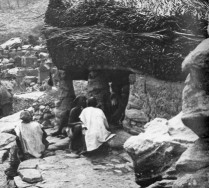 men outside
the Togu Na
men outside
the Togu Na men outside
the Togu Na
men outside
the Togu NaIn West Africa in the kingdom of Mali, are the Dogon. Within the Dogon culture exists a meeting place relative to city hall and central to the life force and cosmology of the community. All manner of business and social issues are discussed here. Rites of passage are performed here. Teaching, work and game playing are happening in this space as well. The "Togu Na" or House of Words is also known as the House of the Mother, although women were not allowed to enter its walls. A related a similar concept, the "Kodzidan" or House of Stories, is also a discourse model for creating community environments which include women and children. (Sutherland,1992)
One of the first places constructed when a Dogon settlement is founded, much discussion takes place in the Togu Na where people learn the art of rhetorical persuasion through the use of logical reasoning. This discussion can be paralleled to the "discussions" taking place in the World Stage.
"The Togu Na is also used for teaching purposes where the spoken word is the seed of knowledge for each type of manual work and for numerous spiritual initiations too" (Spini,1977)
This quote is particularly telling
when using the Togu Na as a comparative model for analyzing the cosmology
of the World Stage. Presenting a work in progress is one example.
In the western academic setting the idea of presenting a work unfinished,
without doing all of the possible research looked upon as a highly questionable
practice. In the safety of the togu na, words and ideas can be presented
before an audience of your peers (the audience). You peers have an
obligation to help you take that "seed" of the word, of the poem and nurture
it into "being" (the critique). An artist can write a poem about
revolution, but in order for revolution to realize itself, it must be accepted
by the members of the community who help take the vision of the revolution
and build it into the way they speak, think and act.
The very act of an artist getting
on stage is more than just overcoming a fear of public speaking. It is
a "spiritual initiation" in that you are required to "not bullshit", open
yourself and be honest. In addition the artists "opneing of self"
is the actual moment of critique, which must be taken as an opportunity
to learn that the process of creation and excellence depends on the existence
of others, and truly what you say has an effect as well.
Both models, the Togu Na or Kodzidan,
can be used to describe African discourse systems and provide us with an
Afrocentric gaze when considering the World Stage and its characteristics.
Emphasis on safe space in which to activate the Ubwenge (active
intellect) is the focus. 
Dj Watson discusses using this model as a structure for her classes in the Black Studies Department at San diego city College.
"Students who speak patois or Ebonics (slave code languages developed to communicate subversively when African languages were suppressed) are embraced in the House of Words, rather than ostracized for not speaking the dominant language continuously; the reality of the imposition of English upon their descendants forced into a state of national illiteracy is also analyzed. Students are encouraged to speak in tongues while at the same time mastering the rules that govern culturally diverse, linguistically rich languages the value of embracing black English spoken in the classroom.
 We begin
by investigating African Philosophical systems--concepts such as
Nommo,
the magic power of the word; Ubwenge, active intelligence;
Ntu
and
DA, the universal life force; A rhetorical analysis highlights the
differences and similarities between African subsystems. By studying the
Yoruba Pantheon for example, a spiritual investigation as an alternative
framework to monotheism, we begin to divine the nature of our stolen legacies.
We begin
by investigating African Philosophical systems--concepts such as
Nommo,
the magic power of the word; Ubwenge, active intelligence;
Ntu
and
DA, the universal life force; A rhetorical analysis highlights the
differences and similarities between African subsystems. By studying the
Yoruba Pantheon for example, a spiritual investigation as an alternative
framework to monotheism, we begin to divine the nature of our stolen legacies.
If we are to become wordsmiths affecting the future in a revolutionary manner which acts to foresee and bring about change, we must tap into our active intelligence.
Thus, in the house of words, you must actively engage your DA through participation in discourse analysis by way of thinking, listening, speaking, writing, debating, and presenting your ideas. A positive wordsmith contributes to the Togu Na thought by thought, breath by breath, word by word. Built word by word, issues such as the decolonization of Africa, neocolonial practices and their political implications and consequences on the African Diaspora or Nemai, including the social, economic and cultural aspects experienced by its global descendants are explored." (Watson, 1997)
click for an enlarged picture of the Togu Na
the pictures scanned on this page are from Tito and Sandro Spini's photojournalistic work, TOGU NA.